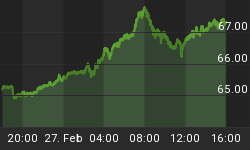The consumer plays an important role in the U.S. economy, accounting for around 70% of GDP. This means that the holiday season takes on considerable significance to those seeking to determine where things are heading. On December 6th, data revealed that consumer confidence in the form of the Bloomberg Consumer Index was close to a seven-month high, while claims for unemployment benefits declined. According to Bloomberg's Michelle Jamrisko, "The holiday season put more Americans in the mood to spend." Despite the fiscal cliff, stubbornly high unemployment (though slowly falling) and a certain trepidation in the corporate world over policy uncertainty, the consumer seems confident enough to spend for the holidays. This is significant because it points to a level of confidence that could benefit from resolution of the fiscal cliff crisis and help push-up real GDP growth later in 2013.
There were positive results for early bellwethers. Thanksgiving night and the four days to follow have traditionally been the biggest shopping days of the year in the U.S. "Black Friday" and "Cyber Monday" begin the holiday shopping season with deep discounts on popular items and extended shopping hours to encourage the frenzy. IBM's annual Holiday Benchmark Reports released for 2012 show strong consumer traffic overall, with a significant increase in mobile and online shopping. The Black Friday report noted 20.7% growth from 2011. Mobile sales on November 23rd (which increasingly includes the night of the 22nd) accounted for over 16% of the total, an increase of more than 65% from 2011's mobile share. Mobile purchasing was propelled largely by users of Apple's iPad and iPhone. Although more was spent overall, the average total per order dropped nearly 5% from 2011's value. This is a direct result of the digital consumer's ability to quickly search countless web stores to find the lowest prices. Adobe Systems reported a total of $1.3 billion in sales spent on Black Friday 2012.
Cyber Monday was the real event for online shoppers this year, described by IBM as "the biggest spending day ever." Online sales on November 26th grew just over 30% from their 2011 levels. The share of mobile sales grew 96% from the previous year, to nearly 13%. Following Friday's trend, the average per-order total dropped more than 6%, as shoppers took advantage of free shipping deals to use multiple retailers for their purchases. Sales on Cyber Monday (a term that has only been around since 2005) reached nearly $2 billion dollars, according to Adobe. They also note that the best results came from so-called "brick-and-click" retailers, rather than those with just an online presence, as they are able to retain older shoppers and those more-hesitant to switch to newer technologies.
It seems that online shopping is the new fixture of the holiday season. As technology trends evolve and consumers are increasingly reliant on their smartphones and other devices to scour the best deals, there is a move away from camping outside department stores waiting for the doors to be unlocked to skipping the mall in favor of navigating the sales online. There will be plenty of data to look at as we march through the rest of the holiday season, but we think it will be surprising on the upside.

There are also some other factors to consider that could help push consumer confidence along. Holiday shoppers are benefitting from discounting, expanded store sales and internet deals. Equally important are the economic factors of cheaper gasoline and an improving job market. The risk is that Washington fails to reach an agreement and the hike in payroll taxes and other items functions like a pin letting air out of a tire. Add to this the impact of other tax hikes that will become evident in 2013 and there will be an erosion of confidence in personal wealth, especially in the middle class. This would come at a time when there was a recovery in the net worth for households and non-profit groups from July to September that increased by $1.72 trillion (2.7%) from the previous three-month period to $64.8 trillion (according to the Federal Reserve's flow of funds report).
The holiday season is in full swing and the consumer is active, but the clock is ticking on how long that confidence lasts. Will Washington disappoint on fiscal consolidation and dampen consumer confidence early in 2013? If so, will consumer confidence be able to return later in the year? These are questions that the country's political class will have to factor into the debate. We suspect that consumer demand will be strong until the end of December and then it will take a break as the politicians eventually reach an agreement. If so, look for consumer demand to be a positive factor in the post-deal environment, though it may be modified by some taxes. Ho! Ho! Ho!















